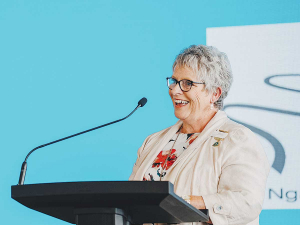Applications Open for 2026 NZI Rural Women Business Awards
Applications are now open for the 2026 NZI Rural Women Business Awards, set to be held at Parliament on 23 July.
 RWNZ national president of Gill Naylor says a one-size-fits-all approach on health will not work for rural communities.
RWNZ national president of Gill Naylor says a one-size-fits-all approach on health will not work for rural communities.
Rural Women New Zealand (RWNZ) is calling for the Government to work with rural communities on rural health.
RWNZ national president of Gill Naylor says rural communities need full resourcing based on their needs.
“A one-size-fits-all approach will not work,” Naylor told Rural News.
RWNZ wants to see a fully resourced co-design programme with rural communities. Naylor says this would identify health and wellbeing needs of the community and develop a plan for servicing those needs.
Her comments come just two months after Health Minister Andrew Little agreed to have a rural health strategy in the Pae Ora Healthy Futures Bill, which passed into law last month.
But Naylor points out that saying there will be a strategy isn’t enough.
“There needs to be a plan in place to make the strategy work and adequate resources in order to enable that plan to be implemented.”
She says a list of changes need to be implemented to help the sector, including changes to immigration policies for nurses, midwives, GPs and other health industry staff.
Naylor believes that NZ needs to make residency and citizenship pathways look more attractive to these workers. She adds also in need of urgent attention is the training to practice pipeline for nurses and nursing students.
“What has been the education pathway has clearly not been working with the lack in numbers of qualified staff so look at other ways of training nursing staff.”
She says one idea could be to move back into the hospitals with on-the-job training with a component of regular uni-based theory to complement.
Naylor would like the sector to be more realistic about salary scales and payment.
“We will keep losing staff overseas as salaries are not keeping up with international expectations.”
One thing that won’t work right now, Naylor believes, is increasing telehealth services.
“Many rural communities do not have the digital capacity or access to reliable internet, and many don’t have cellular coverage. This is not to say that rural communities won’t take up the opportunity to use telehealth, they just can’t access it, through no fault of their own.”
Legal controls on the movement of fruits and vegetables are now in place in Auckland’s Mt Roskill suburb, says Biosecurity New Zealand Commissioner North Mike Inglis.
Arable growers worried that some weeds in their crops may have developed herbicide resistance can now get the suspected plants tested for free.
Fruit growers and exporters are worried following the discovery of a male Queensland fruit fly in Auckland this week.
Dairy prices have jumped in the overnight Global Dairy Trade (GDT) auction, breaking a five-month negative streak.
Alliance Group chief executive Willie Wiese is leaving the company after three years in the role.
A booklet produced in 2025 by the Rotoiti 15 trust, Department of Conservation and Scion – now part of the Bioeconomy Science Institute – aims to help people identify insect pests and diseases.

OPINION: The release of the Natural Environment Bill and Planning Bill to replace the Resource Management Act is a red-letter day…
OPINION: Federated Farmers has launched a new campaign, swapping ‘The Twelve Days of Christmas’ for ‘The Twelve Pests of Christmas’ to…